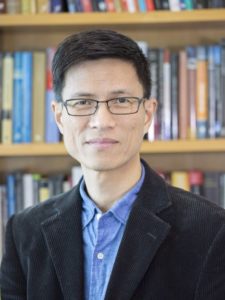The Chinese Exodus: Migration, Urbanization, and Alienation in Contemporary China by Li Ma. Eugene, OR: Pickwick Publications-Wipf and Stock, 2018. Available from the publisher and on Amazon.
By now it is not news that 300 million migrant workers in China have moved from the rural areas to urban centers over the past 30 years. Books, movies, and articles have described this unprecedented massive migration, but few have discussed this topic from a social justice point of view, with in-depth social, economic, and historical perspectives; fewer still with critical theological reflection from a Christian’s perspective.
Li Ma’s The Chinese Exodus: Migration, Urbanization, and Alienation in Contemporary China, published by Pickwick Publications in 2018, is a unique book with those rare and refreshing views.
The Chinese Exodus is more than a sociological analysis of the mass internal migration in China. It describes the context and development of the most significant migration in recent human history, while providing a scholarly analysis of the socioeconomic and historical factors that contribute to the current condition of the migrants’ plight. It gives detailed and intimate portraits of the lives of migrant families and their struggles. Most uniquely, it challenges Christians to reflect on issues of justice as well as compassion, while engendering a theological discussion on Christian ethics in response to this social phenomenon.
The book begins with an excellent introduction to the history of the hukou system, China's system of household registration. For those unfamiliar with the history of ancient China, Li Ma gives a brief but relevant history of how the hierarchical structure and socioeconomic gap between rural and urban populations were developed and ingrained in the culture. This discussion on how and why the Chinese Communist Party reinforced the segregation between the rural peasants and urban dwellers provides a great context for understanding the challenges faced by the migrants. With that context, the theological reflection then allows the reader to see the structural injustice and to question if, in fact, individuals are also liable for contributing to such development.
In the chapter on urbanism and alienation, Li Ma powerfully critiques a system that values economic development over human development, and challenges the materialism and consumer-orientation of the society which both the oppressor and the oppressed rationalize.
In the process of migration, family members are separated. Migrants lose social ties in their rural homes, yet never gain acceptance in the cities. The social exclusion, fragmentation, disintegration of family, and loss of community among these migrants are presented in several intimate stories that the author has documented. These narratives provide a three-dimensional view of the struggles and sufferings of migrant families and open up a theological discussion on the need and importance of community.
The following chapter documents some of the NGOs that have helped alleviate the problems and injustice that migrants face.
The author ends the book with a call for Christians to acknowledge the structural sin of the system and advocates for action and hope to rebuild human communities with a theological understanding of how development impacts human dignity and social justice.
The Chinese Exodus makes a unique contribution to our understanding of the global phenomenon of migration. It takes a historical, social, and cultural perspective with Christian theological reflections and argues that society perpetuates a structurally unjust system that exploits and oppresses migrants. It points out from a Christian perspective that the breakdown of community, disintegration of family, and social exclusion are institutional dimensions of the fallen condition of our society. It challenges individuals as well as the church to a deeper understanding and concern for migrant workers.
The analysis of the book is clear and scholarly, especially on how the system of injustice is sustained, legitimized, and accepted. A very valuable part of the book is the detailed descriptions of the lives of migrant workers and their families. The theological reflections are especially important because they lead to a critique of consumerism and economic development while highlighting the significance of community. Such discussions are rarely found in academic and scholarly work.
However, the unusual mix of scholarly discussion and theological reflection in the book also creates discord in the content presentation. While the analysis is academic, some of the reflections and discussions seem to target laymen in the Christian community. An integration between the sociological analysis and theological reflection would be helpful. Perhaps the author could have used a framework based on liberation theology, or Daniel Groody’s migration theology. Nevertheless, the book is a good starting point for Christians to discuss the important topic of migration and social justice.
This is a book that will interest scholars in Asian or Chinese studies, sociology, social anthropology, development economics, or social work. Christian scholars will also find the book a rare gem as it takes into consideration values and ethics in its analyses and brings to light justice and compassion with its reflections.
Christian intellectuals, especially those in ministry or missions, will find the book very useful in understanding issues of poverty and alienation in China. Indeed, any concerned Christian will be moved by the stories and descriptions of the plight of the migrant workers.
Editor’s Note: A special thanks to the publisher, Pickwick Publications, for providing a complimentary copy of The Chinese Exodus: Migration, Urbanization, and Alienation in Contemporary China, by Li Ma, for our reviewer.
Image credit: Bill Tsang.

Bill Tsang
Director of Research of Youth Global Network; Research Associate at the Wah Ching Centre of Research on Education in China, University of Hong Kong Bill Tsang is currently Director of Research at Youth Global Network (YGN) where he conducts policy action research among migrant youth in China in the area of education …View Full Bio
Are you enjoying a cup of good coffee or fragrant tea while reading the latest ChinaSource post? Consider donating the cost of that “cuppa” to support our content so we can continue to serve you with the latest on Christianity in China.
